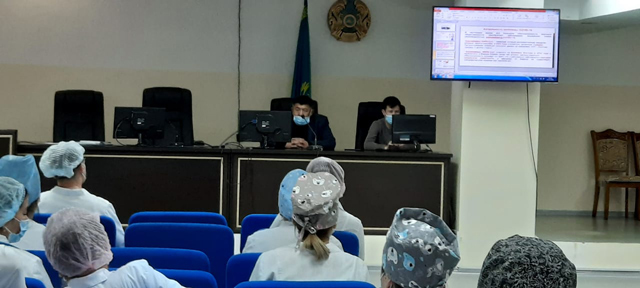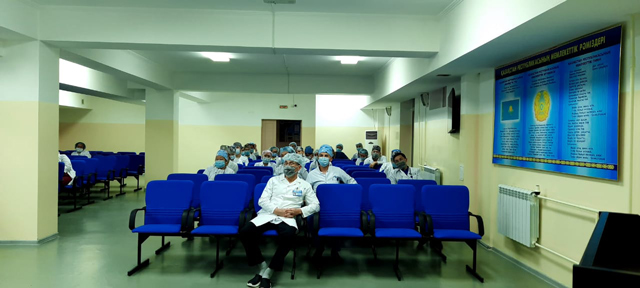SKMA and COVID-19: how the virus remains viable and how important is the algorithm for providing emergency medical care
Since the beginning of 2020, the concern of the world community has been focused on one of the representatives of a large family of coronaviruses (more than 40 strains) - COVID-19. Zh.K. Zhumabekov, PhD, docent of the Department of Pediatrics-2, told the participants about viruses that retain their viability. The lecturer suggested that attention should be paid to this not only in universities, secondary schools, transports, supermarkets and food markets, but also in medical institutions and organizations of primary health care in Shymkent.

"So, the virus in the feces of patients with diarrhea persists up to 5 days; on the surface of paper, chairs-up to 3 days; on the surface of metal and plastic-up to 3 days; on the surface of glass - up to 96 hours. And only under the influence of conventional disinfectants or when heated to 56°C, the virus loses its strength and is destroyed. If you will not adhere to hygiene standards, then a lot depends on the algorithm for providing emergency medical care.

All people whose actions related to the examination, transportation, work in the hearth, hospitalization, treatment and maintenance of patients with COVID suspect should use personal protective equipment (masks or respirators of a high degree protection (at least protection class 2 or FPP2), gloves, face protection screens, a clean, non-sterile, water-resistant long-sleeved robe (or water-resistant disposable suit, or water-resistant overalls), rubber boots or high rubberized shoe covers. Recovered patients are discharged from the hospital, with recommendations - to be observed by a General practitioner at the place of attachment, Zh.K. Zhumabekov emphasized.
The lecturer attributed for preventive measures the monitoring of contact persons for 14 days with daily monitoring of body temperature, the presence of cough and shortness of breath.
Health workers of polyclinics should conduct informational and explanatory work for people who have been in contact with patients of COVID suspect on the signs of the disease, timely seeking medical help when symptoms of acute URI appear, the need to limit visits to crowded places, wearing masks, and washing hands.
For three days, from November 11 to 13, teachers and leading scientists of the South Kazakhstan medical Academy held training seminars on coronavirus infection for doctors and medical workers of polyclinics and medical institutions in Shymkent.
 797 views
797 views
